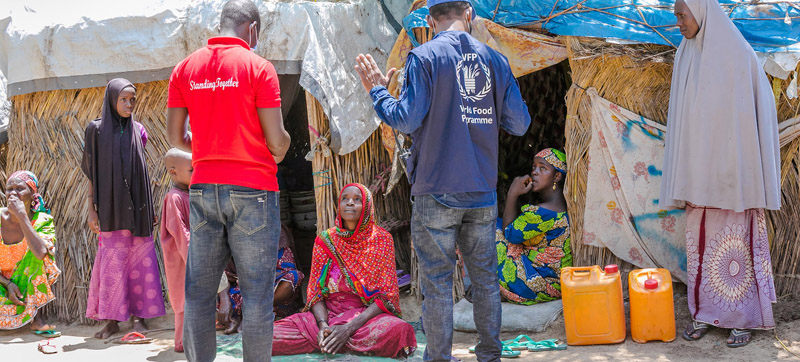 Food Insecurity
Food Insecurity COVID-19 worsening food insecurity, driving displacement, warn UN agencies
New York: Global hunger and population displacement, which were already at record levels when COVID-19 struck, could “surge” as migrants and those reliant on a dwindling flow of remittances desperately seek work to support their families, a new UN report has warned.
In Populations at risk: Implications of COVID-19 for hunger, migration and displacement, the UN World Food Programme (WFP) and the International Organization for Migration (IOM) urged the global community to step up support for the immediate and rising humanitarian needs, as well as addressing the pandemic’s fallout, especially on the most vulnerable.
“Many people in low- and middle-income countries, who a few months ago were poor but just about getting by, now find their livelihoods have been destroyed,” he said. David Beasley, Executive Director of WFP, said that the socio-economic impact of the pandemic is more devastating than the disease itself.
“Remittances sent from workers abroad to their families at home have also dried up, causing immense hardship. As a result, hunger rates are sky-rocketing around the world.”
The report – the first of its kind – assessed the implications of the COVID-19 pandemic for people’s food security in major migration and hunger hotspots around the world. It revealed important linkages between the two, with food insecurity – especially when combined with conflict, being one of the main drivers for people to move.
Unprecedented impact
The impact the pandemic has had on the ways people move is “unprecedented”, according to the two UN agencies.
Measures and restrictions put in place to contain the spread of the disease have limited human mobility, opportunities to work and earn an income, straining the ability of migrant and displaced people to afford food and other basic needs.
António Vitorino, Director-General of IOM, highlighted COVID-19’s impact on health and human movement, warning that it not only threatens global commitment but also ongoing assistance.
“The impact of the COVID-19 crisis on health and human mobility threatens to roll back global commitments, including for the Global Compact on Migration, and hinder ongoing efforts to support those in need of assistance,” he said.
“It is our collective responsibility to safeguard the rights of people on the move and ensure their protection from further harm,” he added.
Hunger, displacement ‘closely intertwined’
According to the report, food insecurity and displacement are closely linked: nine out of ten of the world’s worst food crises are in countries with the largest number of internally displaced persons, while the majority of displaced people are located in countries affected by acute food insecurity and malnutrition.
Migrant workers, especially those working in the temporary or informal sector, are some of the worst hit by the pandemic and its fallout. Without sustained income, many will not only be pushed to return home but will also cause at least a temporary drop in remittances that provide an essential lifeline for around 800 million – or one in nine – people in the world, the report added.
"It the same time, disruptions to seasonal agricultural work could hit the production, processing and distribution of food, affecting food availability and affordability at local and regional levels.
Protect the most vulnerable
WFP and IOM urged the international community to ensure that every effort is made to limit the immediate impact on the most vulnerable, while ensuring longer term investments for a pathway to recovery.
They outlined eight priority actions, which include ensuring access to humanitarian assistance for migrants facing acute hardship; safeguarding support for the displaced and their host communities; securing access to critical services and inclusive information for all mobile and displaced populations; and facilitating remittance flow as an essential financial service.
They also highlighted the need to recognize the positive contributions of migrants and to promote their inclusion in social protection systems; ensure their access to legal services; counter xenophobia, stigmatization and discrimination towards people on the move; and improve data and analysis to better understand the dynamics between the pandemic, and mobility, remittances and food security.
Support Our Journalism
We cannot do without you.. your contribution supports unbiased journalism
IBNS is not driven by any ism- not wokeism, not racism, not skewed secularism, not hyper right-wing or left liberal ideals, nor by any hardline religious beliefs or hyper nationalism. We want to serve you good old objective news, as they are. We do not judge or preach. We let people decide for themselves. We only try to present factual and well-sourced news.







